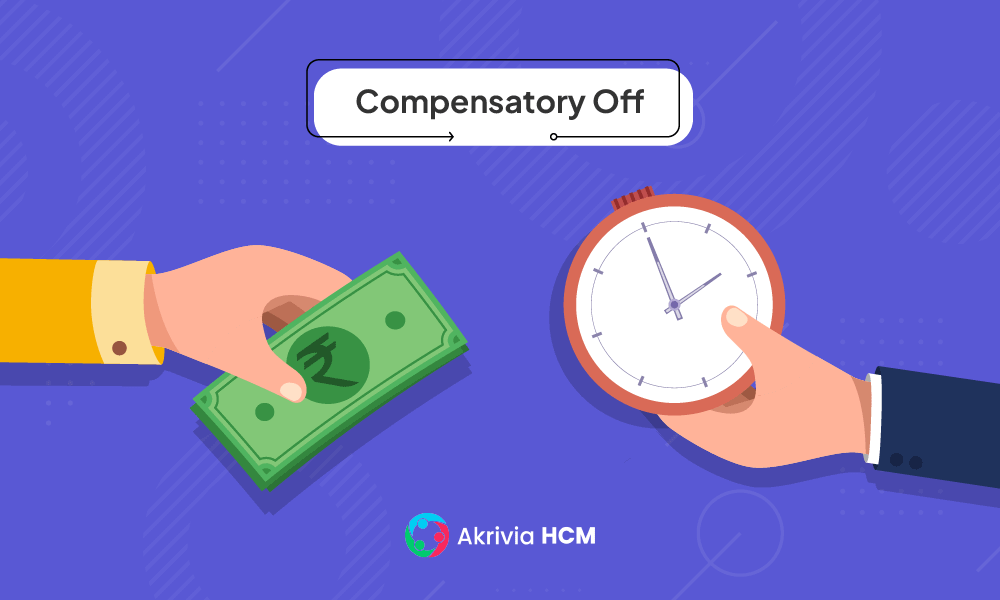Table of Contents
Compensatory off refers to paid leaves that employees can take in lieu of working on a holiday or a weekend at the employer’s request. Compensation is given as time off rather than monetary compensation. Employees often receive these as rewards for their extra efforts towards meeting organizational goals.
Competitive employee benefits packages can help you attract and retain talented employees. Types of leave within such packages include annual leave, maternity leave, sick leave, parental leave, and more. Employers encouraging staff to go the extra mile should consider offering compensatory leave benefits. This gives employees additional paid time off if they work overtime, during unusual hours, or on holidays.
Compensatory off days are a way of taking care of employees on behalf of the organization so that employees will take equal care of the organization by maximizing their efforts.

Compensatory off policies differ from organization to organization. But commonly, when employees work on public holidays, they can be compensated by taking the next day off or through a period equal to their regular hours if they come to the office to work. The same rule applies to employees who work on weekends, as long as they are genuinely at work.
For example, if a weekly off or public holiday falls during your work tour, you will be given a half-day compensatory off. But, if you are traveling for personal purposes on your weekly off or public holiday, it will not be considered a working day, and you will not receive compensatory time off. Comp time is only given for the hours employees spend on work activities.
Having compensatory off policies can offer the following benefits:
Every organization has different rules for providing compensatory off. While some organizations only allow full time employees to take comp off, some organizations also extend the benefit to their part-time or probationary employees.
The steps to apply for comp off differ from company to company, but we’ve outlined a few common ones below:
Step 1: Before requesting a comp off, employees should be sure to read the organization’s guidelines. This will ensure that they put in an application that meets all requirements and makes the process as easy as possible.
Step 2: To recover extra time worked, you may need to seek approval from your manager or submit an expense report, depending on the rules of your organization.
Step 3: Once a comp-off request has been submitted to a manager, the manager has the discretion to approve or deny the request.
Before implementing a comp-leave policy, it’s important to craft and communicate a clear leave policy to reduce confusion about when employees can take leave.
Some common examples of compensatory off include:
Companies can set restrictions on their employees taking compensatory offs, as per their needs. Countries like UAE don’t have any laws on how compensatory offs can be used, that’s why it’s often determined by negotiations between the employee and employer only.
Some companies also set rules for the maximum numbers of compensatory offs an employee can take within a year.
Often, companies also have rules that compensatory off must be taken within the same pay period as in which the overtime was worked which makes it difficult for employees to take time off during seasonal surges.
Compensatory off ensures your time is respected and valued and holds employees and organizations accountable for the true worth of everyone’s time. Employees will feel valued and supported, and managers will feel accountable for their employee’s well-being. With Akrivia HCM Leave Management System, you can manage and track all the comp offs of your entire workforce.
No, compensatory off is different from accrued leave. Compensatory off is paid leave that is given to compensate for working on a weekend or holiday. Accrued leave is paid leave that is given for working a specific number of days or hours within regular work schedules.
Compensatory off policies differ from organization to organization. Government employees can take compensatory off, if their employer institution has policies for the same.
Yes, compensatory off are paid leaves so employees do not incur any loss of pay when they take compensatory offs.
Let’s Recruit, Reward, and Retain
Your Workforce Together!
